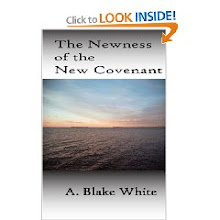 NCT’S PRINCIPLE OF REPRESENTATION
NCT’S PRINCIPLE OF REPRESENTATIONNCT places a strong emphasis on the type/anti-type dimensions of Scripture. The nation of Israel in the OT is seen as a type and promise. The church in the NT is seen as the anti-type and fulfillment. In other words, the church became what the nation of Israel never was, and never could be. This is not saying that the nation of Israel were not nationally elect. Nor is it denying that there were spiritually elect people of God residing in the Israelite community throughout history. It is simply arguing that from top to bottom and throughout their history, the nation of Israel rejected their status as “God’s people”. That is, they never obeyed God (nationally) as God intended them to and to the degree they themselves intended to obey God (Exodus 19:3-8). Logically, this does not necessitate a view that sees God as failing with His “first” people (Israel), and therefore reaching out to a “second” people (the church). NCT robustly holds to a view of God that emphasizes His sovereignty. And in God’s wise sovereignty He chose redemptive history to play out the way in which He did. As I write this blog I am going to do something that might be a little dangerous. Indeed, I might regret it later. But a thought just crossed my mind, and I want to share it with you. Here it is. I submit to you that the primary purpose of God nationally electing Israel is ultimately threefold: 1) to reveal His power and glory, 2) to show Israel, and the other nations throughout all time the exceeding sinfulness of man and his innate inability to ever obey God perfectly even after being placed in a “privileged and unique relationship” with God Himself, 3) to preserve a line for the Messiah (the Redeemer) to come.
Now this thing I simply call the principle of representation shows that NCT disagrees with DT, which affirms that there are two people of God. NCT would agree with CT that there are one, true people of God. On the other hand, NCT would disagree with CT that this one true people (known as the “Church”) existed in the Old Testament period. If this sounds rather confusing, just take a step back, breath deeply, and refocus. Let me provide something for you that might help.
Dispensationalism
Overview of redemptive history from God’s vantage point:
-I will choose a people to worship me. It will be Israel.
-This nation is rebellious. Thus, I will extend my hand of grace to those outside of Israel. This will be a separate entity made up of Jew and Gentile. It will be called the Church.
-However, I will remain faithful to my earlier promises to Israel. Thus, at the end of the day national Israel will worship Me.
Covenant Theology
Overview of redemptive history from God’s vantage point:
-I will choose a people to worship me. It will be Israel/the Church.
-When Christ comes my grace will extend to the nations and they will be joined to Israel/the Church. At this time the church will no longer be largely composed of Jews, but will include Gentiles.
New Covenant Theology
Overview of redemptive history from God’s vantage point:
-I will choose a people to worship Me. It will be Israel. They will not worship Me, and this is My very purpose in choosing them. When they refuse to worship Me, it will reveal to all men his need of Me.
-Within Israel I will preserve a remnant- those who will have faith in Me and worship Me; sincerely trusting in the same promise that Abraham did. From this people will come the true Israel- the Messiah-who will do what the nation never did. He will be perfectly obedient to My law.
-When Christ comes My grace will extend to the nations. This new entity made up of Jew and Gentile will be called the Church. They will be the true Israel, for they will exist in the "true Israel" (their Savior, Jesus Christ). For they will do what national Israel (the people I began with) never did- they will worship Me forever! I will empower them to do so!
Now let me give one more clarification to what NCT teaches. NCT does not deny that there were literal promises fulfilled in national Israel. However, NCT would largely argue that the land promises given to national Israel find their fulfillment (at least partly) in the new covenant inheritance of salvation (Ephesians 1:11; Colossians 1:12; I Peter 1:4).
Here is a way that helps me remember NCT:
One Promise- God will restore sinful man to relationship with His Creator.
One Person- Jesus Christ is the central figure in Scripture (not the people of Israel).
One People- There is only one people of God for all time who know their Creator only through one person- Jesus Christ.
One Path (of interpretation)- The New Testament primarily interprets Old Testament.
So in conclusion, if you can remember these six principle (NCT's principle of: interpretation, separation [of Old and New Covenant], unification [of salvation], progression [of Revelation], application [of law], representation) as we go through a more detailed look at NCT it will do you well. It should keep your thougths organized.
The next posts will follow my traditional outline of the various systems of theology. We will look at some definitions of NCT, some distinctions, and some dissection.
Trying to Focus on the Centrality of Jesus Christ in All Things,
Pastor Andy








Andy, One of the reasons some NCT theologians have enjoyed a good amount of progress is because they have set aside considering the possibilities of a future for the elect within ethnic Israel in favor of furthering their understanding of how the promises made to the Fathers concerning the New Covenant were received by Messiah's apostles at Pentecost. Eschatology, as interesting as it is, has only served to distract them from their efforts to deepen their understanding of the height, width and depth of the New Covenant rule of Jesus Christ within the present New Covenant community. This is why brethren, who may not agree on future things, find much agreement with regards to "present" things.
ReplyDelete